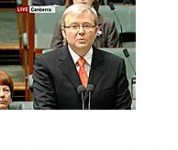Two letters

Today¿s (12 september, 2009) Indian Express carried a letter ostensibly written by me, except that it was a complete distortion of what i had actually written in response to an edit yesterday.
If even a letter can get censored/changed how much of news gets managed?
Gautam Navlakha
|
What Navlakha wrote This is with reference to your edit on "Batla and Ishrat" which is not only unfortunate, it is facetious. the fact that MHA informed the Gujarat police about their suspicion that Javed Sheikh was associated with LeT has been turned into a certainty. the Gujarat police instead of investigating the matter went in for "kill". thus the real issue is sidelined. that UPA government is trying to extract mileage from this cannot take away from this incident the much larger issue of the role of the Gujarat government and its police force in hunting down Muslims on mere suspicion. that the law ministry is investigating the role of the law officer who submitted the affidavit then becomes imperative. on what basis did the law officer and the MHA confirm that Ishrat and three others were LeT members? and even if they were how come they were killed after apprehending them two days earlier? is it true that IB was involved in a sting operation to ensnare Javed Sheikh? to gloss over all this and to accuse Law Ministry of "political opportunism" is to legitimise the use of encounter by Gujarat police for self gratification and for feeding into anti- Muslim hatred so central to Hindutrva perspective. |
What the Express carried This refers to the editorial Batla and Ishrat, (IE September 11). Its unfortunate that the UPA is trying to play politics on the back of an alleged fake encounter, for which the Gujarat Government may be responsible. That those killed were liely LeT operatives does not take away from the illegality of a fake encounter. On the other hand, being killed in a fake encounter does not absolve a terrorist of his/her crime. These are two separate issues at hand. There is a lot amiss apparently in the affair with the roles of neither the Union nor the Gujarat government quite clear. The public deserves to know the truth of the matter. |
The edit that Navlakha was commenting on, The Indian Express, Sept. 11,09
Batla and Ishrat
The Union law ministry's reported decision to initiate action against a law officer who filed the Centre's affidavit in the Ishrat Jahan case reeks of the kind of politics that is irresponsible and has the potential to communalise the UPA government's policy on tackling terrorism. In the Gujarat high court, the Centre had filed an affidavit agreeing with the state police that Ishrat and her three accomplices had links to the Lashkar-e-Toiba. But the case has since acquired political overtones, with Law Minister Moily more or less agreeing with a magistrate's report 念39;?¿ï¦£39;?念39;?¿ï¦£39;?" which has since been stayed by the high court 念39;?¿ï¦£39;?念39;?¿ï¦£39;?" claiming that the encounter was staged. Now, even though the home ministry stands by the affidavit, Moily's law ministry has begun action against Assistant Solicitor General P.S. Chamapaneri for failure to apprise the ministry of the contents of the affidavit submitted by the home ministry.
This amounts to political opportunism by the Centre, a craven disregard for the sanctity of intelligence inputs. As the Union home secretary has pointed out, the affidavit only stated that the Intelligence Bureau believed that those killed were terror suspects; it had no view on the genuineness of the encounter. But the law ministry has other ideas. By trying to discredit the Centre's own affidavit, it risks choosing politics over national security. The practice of killings-for-awards violates the due process that our legal system affords everybody, even those accused of terrorism. If found guilty, the sternest action must be taken against the state police officials involved. But by making this is a Modi versus UPA brawl, sending out conflicting signals, and trying to discredit a neutral input given to the Gujarat state police, the Centre is putting at risk the kind of intelligence sharing that counter-terrorism so badly requires.
The flip flops by assorted Congressmen over the Batla House encounter in Delhi in September 2008 had created political confusion, which was only quelled by the Centre's more coherent post-26/11 strategy. Now, to have the spectacle of two key ministries in disagreement, with one of them clearly showing that its focus is more political than procedural, against raises disturbing questions.